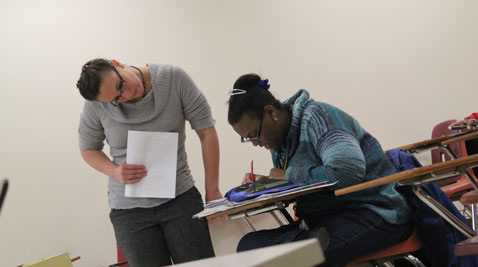BALTIMORE -Maryland’s first 4-year college program for young adults with intellectual disabilities is living up to its name.
Now in its second year, the SUCCESS program — which stands for Students United for Campus-Community Engagement for Post-Secondary Success — has seen the number of applicants nearly triple.
The program at the University of Maryland, Baltimore County, is currently the only opportunity for Marylanders with intellectual disabilities, like autism or Down syndrome, to participate in classes and internships alongside their peers at a 4-year college. It is a non-degree program that focuses on preparing students for employment and independent living, said Michele Wolff, who oversees the program.

“I wish that every young person who wants to go to college would get this experience that the SUCCESS program has laid out,” said Gwen Moody of Hyattsville, whose 23-year-old daughter, Quintanna, is now in her second year of the program.
“My daughter always talked about wanting to go to college,” she said. “She was very excited about it when she found out she was accepted – she just cried.”
Quintanna Moody was born prematurely – at just 6 months – and has suffered developmental delays, her mother said. She now has the chance to experience campus life while learning valuable life skills, her mother said.
The state-funded SUCCESS program is run through UMBC’s Shriver Center, an applied learning and civic engagement resource named in honor of Sargent Shriver and Eunice Kennedy Shriver, founder of the Special Olympics.
The curriculum includes lessons on everything from practical skills like budgeting and meal planning, to artistic expression through acting, drawing and photography, said Wolff, director of the Shriver Center. Students also complete internships in their field of interest.
Each year, between six and eight students are admitted and enroll in courses taught by faculty members, Wolff said. Classes sometimes include traditional students who are recruited to work with and alongside the students in the program, she said.
Evan Davis, a first-year SUCCESS student, said he is enjoying his time at UMBC. The 21-year-old, dressed in a dark suit and bright blue tie, works as intern at the math department and said he likes to dress up on the days when he works.

“I like what I do here,” he said, “Y’know, like having a job.”
Assistant Professor Amy Hurst has been teaching in the UMBC Information Systems Department for four years. She is a guest lecturer in the first-year seminar class, which includes both traditional and SUCCESS students, and also teaches a week-long unit to SUCCESS students on computer and technology-related topics
Hurst said she teaches the same concepts she uses in her traditional classes and does not modify her curriculum for SUCCESS students.
“I haven’t adapted at all….I just pick things that I would do in other classes that are very hands-on or very visual,” she said.
Hurst’s past units have included lessons on blogging and 3-D printing.
Erin Buehler, a doctoral student at UMBC and a teaching assistant for the SUCCESS program, said working with the students has been an extremely positive experience.
“I’ve learned a great deal about intellectual disabilities – I’ve met some wonderful students,” she said.
Hurst and Buehler both said they have witnessed SUCCESS students become part of the UMBC community over the past year.
The next step for these students is to find housing near campus, Gwen Moody said. Right now, she said, she and her husband take turns making the hour-long commute to take Quintanna Moody to and from school.
Wolff said one advantage of pioneering a program like this is the ability to modify it based on the concerns and opinions of students and parents.
“We are building the program as we go, which is…a benefit and a challenge,” she said. “The benefit … is that we can really listen to the students and their families … and build the program based on their interests.”
Capital News Service video by Kara Dixon.


You must be logged in to post a comment.